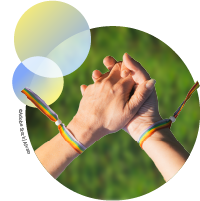Providing protection and safety to LGBTIQ people
Lesbian, gay, bisexual, trans, intersex and queer (LGBTIQ) people in the EU suffer discrimination, hatred and harassment daily. This can lead to damaging effects to physical, mental, and emotional well-being. We must strive to protect the rights and safety of LGBTIQ people.
For some people in the EU, it is still unsafe to be open about their sexual orientation, gender identity, gender expression and sex characteristics, and to simply be themselves without feeling threatened. An important number of LGBTIQ people are also at risk of poverty and social exclusion. Not all feel safe to report verbal abuse and physical violence to the police.
The EU must be at the forefront of efforts to better protect LGBTIQ people’s rights and actively promote equality and non-discrimination across Member States.

felt they have been discriminated against for being LGBTIQ

agree that same sex marriages should be allowed across the EU

have experienced harassment for being LGBTIQ
Sources: Eurobarometer 2023, European Union Agency for Fundamental Rights (FRA) 2019 survey
LGBTIQ Equality Strategy 2020-2025
In 2020, the Commission adopted the first-ever strategy on LGBTIQ equality.
The strategy sets out a series of targeted actions to address the inequalities affecting LGBTIQ people, to integrate LGBTIQ equality in all policy areas, and to help lift the voices of LGBTIQ people. It aims to bring together Member States and actors at all levels in a common endeavour to combat LGBTIQ discrimination more effectively by 2025.
The strategy focuses on four main pillars:




Tracking progress
The progress report on the strategy’s implementation, published in 2023, shows that hatred and anti-LGBTIQ narratives have widely spread in European societies in recent years. The Commission has taken measures to tackle this and has not hesitated to initiate infringement procedures in cases where the fundamental rights of LGBTIQ people have been violated.
On the other hand, the report found that a growing number of EU countries have adopted national LGBTIQ action plans or strategies to combat discrimination against LGBTIQ people. They have also introduced or amended laws to extend the scope of protection against discrimination based on gender and sexual orientation.
Although progress may take time, many of the measures contained in the LGBTIQ Equality Strategy 2020-2025 have been delivered or are being implemented with the aim to mainstream equality into all EU policies, legislation, and funding programmes, and to continue to promote an intersectional approach and attention to LGBTIQ people.
Supporting LGBTIQ people
The European Commission financially supports projects promoting LGBTIQ equality, for instance through the Citizens, Equality, Rights and Values (CERV) programme.
In addition, 5 European LGBTIQ umbrella organisations receive direct financial support through CERV grants:
- the European Region of the International Lesbian, Gay, Bisexual, Trans and Intersex Association (ILGA Europe)
- the International Lesbian, Gay, Bisexual, Transgender, Queer Youth and Student Organisation (IGLYO)
- Transgender Europe (TGEU)
- Organisation Intersex International Europe (OII Europe)
- Eurocentralasian Lesbian* Community (EL*C)
Testimonies
The European Commission is also committed to sharing video testimonies of personal stories by LGBTIQ people across Europe.
Legal protection for LGBTIQ people

EU law ensuring legal protection against discrimination is key to advancing LGBTIQ equality.
EU legislation currently prohibits any discrimination based on sexual orientation in employment and occupation: including access to employment; negative treatment and bullying from colleagues; and access to promotions and training.
The European Union is focused on enforcing and improving legal protection for LGBTIQ people in various key areas, including:
- Reinforcing legal protection for LGBTIQ people against hate crime, hate speech and violence
- Ensuring rights and improving the protection of LGBTIQ people and families in cross-border situations
- Upholding the rights of LGBTIQ migrants and applicants for international protection
EU countries are required to comply with the EU Charter of Fundamental Rights when implementing EU law. Fundamental rights are also usually protected by your country’s constitution. If you feel that your equality rights are being breached, see how you can file a complaint at national level.



